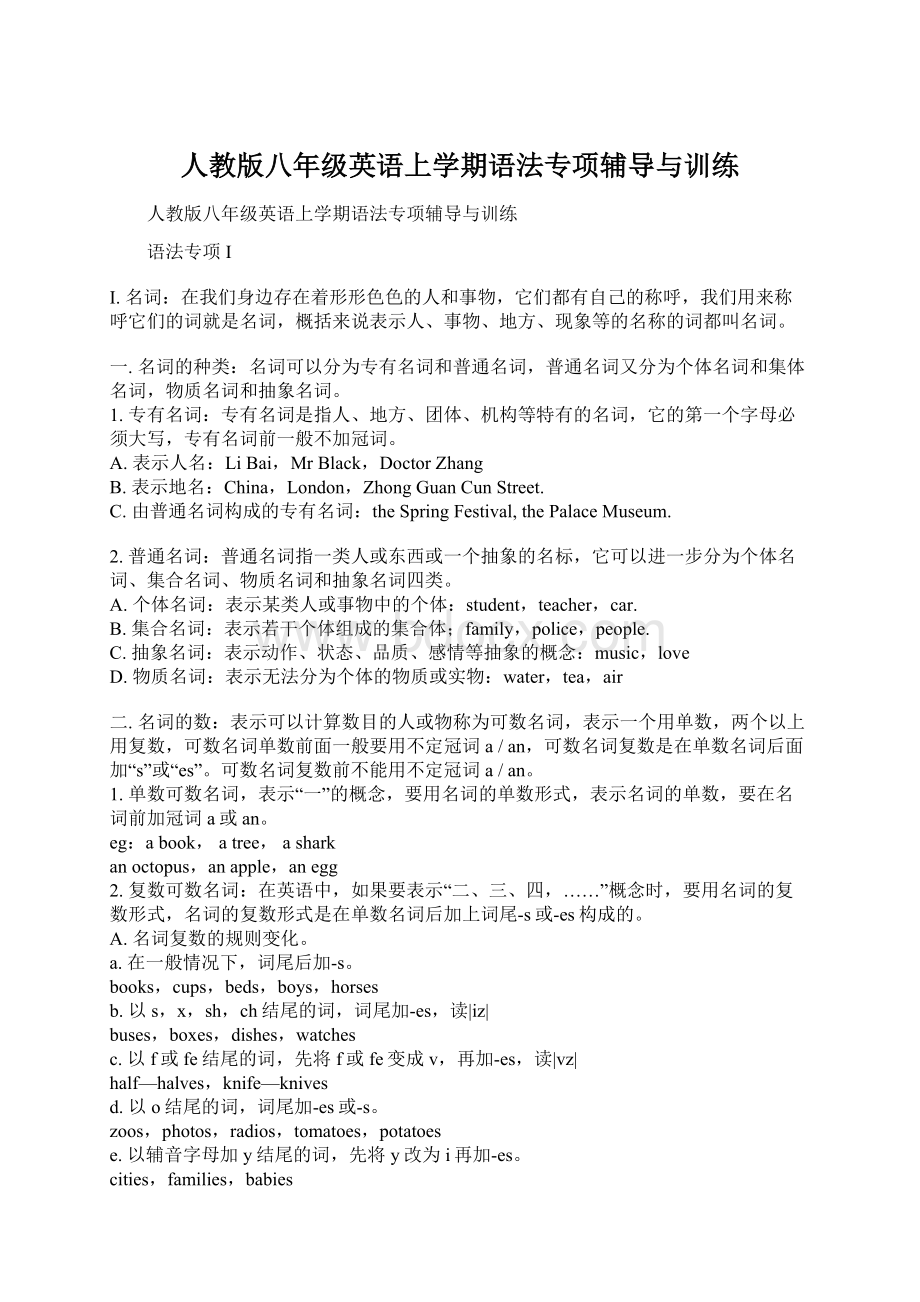人教版八年级英语上学期语法专项辅导与训练Word格式.docx
《人教版八年级英语上学期语法专项辅导与训练Word格式.docx》由会员分享,可在线阅读,更多相关《人教版八年级英语上学期语法专项辅导与训练Word格式.docx(24页珍藏版)》请在冰豆网上搜索。

eg:
abook,atree,ashark
anoctopus,anapple,anegg
2.复数可数名词:
在英语中,如果要表示“二、三、四,……”概念时,要用名词的复数形式,名词的复数形式是在单数名词后加上词尾-s或-es构成的。
A.名词复数的规则变化。
a.在一般情况下,词尾后加-s。
books,cups,beds,boys,horses
b.以s,x,sh,ch结尾的词,词尾加-es,读|iz|
buses,boxes,dishes,watches
c.以f或fe结尾的词,先将f或fe变成v,再加-es,读|vz|
half—halves,knife—knives
d.以o结尾的词,词尾加-es或-s。
zoos,photos,radios,tomatoes,potatoes
e.以辅音字母加y结尾的词,先将y改为i再加-es。
cities,families,babies
B.名词复数的不规则变化。
man—men,tooth—teeth,child—children,sheep—sheep
C.有些名词只有复数形式
clothes,trousers,pants,glasses
3.不可数名词表示量的概念时,在这些词前加上数量词。
acupofcoffee,apieceofpaper,threeslicesofbread
II.不定代词,我们所学的不定代词有all,both,each,every,some,any,many,much,(a)few,(a)little,either,neither,other,another,no,none以及含有some-,any-,no-等的合成代词,这些不定代词大都可以代替名词和形容词,在句中作主语、宾语、表语和定语。
一.some,any及其合成词的用法。
1.基本用法
some,any可与单、复数和不可数名词连用。
some用于肯定句中,而不能用于疑问句中,any一般用于否定句,疑问句和条件句中。
Ihavesomeinterestingbooks.
Thereissomeyogurtinthebottle.
Idon’thaveanymoney.
Werethereanysharksintheaquarium?
2.特殊用法
在疑问句中,一般不用some,只有当问句表示一种邀请或者请求,或期待一个肯定的回答时才能用some。
Wouldyoulikesomemoretea?
二.all,both的用法
1.all代表或修饰四个以上的人或事物,或不可数的东西。
Wealllikeeatpotatochips.
Allthestudentsinourclasswenttothezoo.
2.both是指“两者都……”
Thetwinsbothhavelonghair.
Therearemanytreesonbothsidesofthestreet.
三.many,much,(alot),afew,few,alittle,little。
这些词都可以表示数量,并且都可以修饰名词。
1.many,alot,afew,few修饰可数名词;
much,alot,alittle,little修饰不可数名词。
2.many,much,alot,afew,alittle表示肯定的意思:
few,little表示否定的意思。
Howmuchrelishdoweneed?
Thereareafewminutesleft,aren’tthere?
Thereisalittletimeleft,isthere?
III.形容词的比较等级:
英语中的形容词,在表示“比较——”和“最——”这样的概念时,要用特别的形式,称为比较级和最高级。
原级比较级最高级
young(年轻)younger(比较年轻)youngest(最年轻)
一.变化形式如下:
1.规则变化
构成法原级比较级最高级
一般单音节词和部分双音节词在词尾加-er[](比较级)和-est[ist](最高级)
以不发音的e结尾的单音节词和少数以le结尾的双音节词只在词尾加-r(比较级)和-st(最高级)
“辅音字母+y”结尾的双音节词,将词尾的y改为i,再加-er和-est
重读闭音节词,只有一个辅音字母结尾时,要双写该辅音字母,再加-er,-est
部分双音节词和多音节词,在该词前面加more和themost构成比较级和最高级tall高的(adj.)
great巨大的(adj.)
fast快(adj.&
adv.)
near附近的(adj.&
nice好的(adj.)
large大的(adj.)
able有能力的(adj.)
late晚,晚的(adj.&
easy容易的(adj.)
busy忙的(adj.)
early早(adj.&
big大的(adj.)
hot热的(adj.)
thin细的,瘦的(adj.)
important重要的(adj.)
beautiful漂亮的(adj.)
slowly慢(adv.)
quickly快(adv.)teller
greater
faster
nearer
nicer
larger
abler
later
easier
busier
earlier
bigger
hotter
thinner
moreimportant
morebeautiful
moreslowly
morequickly
thetallest
thegreatest
(the)fastest
(the)nearest
thenicest
thelargest
theablest
(the)latest
theeasiest
thebusiest
(the)earliest
thebiggest
thehottest
thethinnest
themostimportant
themostbeautiful
(the)mostslowly
(the)mostquickly
2.不规则变化
good好的(adj.)
well健康的(adj.)
好(adv.)
bad坏的(adj.)
ill有病的(adj.)
badly坏(adv.)
many多(adj.&
much多(adj.&
far远(adj.&
little少(adj.&
old老的(adj.)
late迟的,晚的(adj.)better[’bet]较好的(地)
worse[w:
s]更坏(地)
更差(地)
more[m:
]更多的,更加
farther[’fa:
]较远
further[’f:
]进一步
less[les]较少的(地)
older[’uld]较老的
elder[’eld]年长的
later较迟的,较近的
latter[’lt]后者(the)best[best]最好的(地)
(the)worst[w:
st]最坏(地)
最糟(地)
(the)most[must]最多的(地)
(the)farthest[’fa:
ist]最远的(地)
(the)furthest[’f:
ist]最深远的(地)
(the)least[li:
st]最少的(地)
theoldest[’uldist]最老的
theeldest[’eldist]最年长的
thelatest(时间上)最近的
thelast(顺序)最后的
比较:
elder和eldest主要用于表示家庭成员之间的长幼关系,如:
eldersister姐姐。
older和oldest则用于表示年龄大小。
Theyareinthesameage,butLilooksmucholderthanMa.
他们两个在年龄上一般大,但看起来李比马老的多。
二.形容词比较等级的用法。
形容词比较等级通常分为原形,比较级和最高级三种基本形式,具体而言,它们分别以下列形式出现在句中:
(1)as+原形+as表示“……和……相同”。
(2)比较级+than表示“……比……较为……”。
(3)the+最高级+of/in表示“在……中最为……”。
Mydogisasoldasthatone.
Thejacketisascheapasthatoldone.
Isheasbusyasbefore?
MaryisfunnierthanJane.
Hisbrotherisyoungerthanme.
Tomisthehappiestofusall.
Springisthebestseasonoftheyear.
三.需要注意的一些问题。
1.在形容词比较级前还可以用much,even,far,alot,still,alittle来修饰,表示“……的多”,“甚至……”,“仍然,还……”,“更……”,以加强语气。
Ourcityismuchmorebeautifulthanyours.
JapanisalittlelargerthanGermany.
2.表示“大几岁”,“高……”等,句型用“表示数量的词+形容词比较级。
”
I’mtwoyearsolderthanyou.
Sheisaheadtallerthanme.
3.表示“越来越……”,句型用“比较级+and+比较级”。
Chinaismoreandmorebeautiful.
Theearthisgettingwarmerandwarmer.
4.表示“是最……之一”句型用“oneofthe+形容词最高级”。
BeijingisoneofthebusiestcitiesinChina.
OneofthemostimportantlanguagesisEnglish.
【模拟试题】
(答题时间:
80分钟)
一.可数名词用a/an,不可数名词用some填空。
举例:
chairachair
(1)book
(2)tree(3)fruit
(4)paper(5)work(6)bread
(7)cheese(8)news(9)information
(10)music(11)petrol(12)air
(13)water(14)meat(15)newspaper
(16)egg(17)hour(18)problem
(19)job(20)tomato(21)soup
(22)money(23)fish(鱼肉)(24)sheep
(25)island(26)airport(27)office
(28)window(29)bank
二.写出下列名词的复数形式
childchildren
(1)noodle
(2)tooth(3)man-doctor
(4)foot(5)mouse(6)potato
(7)photo(8)family(9)wolf
(10)knife(11)woman(12)policeman
(13)bed(14)grade(15)class
(16)box(17)shelf(18)fish
(19)sheep(20)deer(21)tomato
(22)hero(23)hamburger(24)clothes
(25)trousers(26)shoe(27)wife
(28)half(29)church(30)jacket
(31)boot(32)sweater(33)blouse
(34)shirt(35)necklace(36)dress
(37)umbrella(38)watch(39)purse
(40)city(41)monkey(42)boy
三.选词填空,完成下面的对话。
Ben:
Now,havewegot
(1)_______________weneed?
Sam:
Well,let’ssee.Thereare
(2)__________onionsandpotatoes,buttherearen’t(3)____________mushroomsand,ofcourse,thereisn’t(4)____________mincedbeef.
Arethere(5)_____________carrots?
(6)___________.Butwedon’tneed(7)__________,sothat’sOK.
How(8)_________milkisthere?
Only(9)___________.Andthereisn’t(10)__________butter,andwehaven’tgot(11)___________cheese.
Well,wedon’tneedmuchcheese.Isthere(12)__________else?
No,notforShepherd’sPie.We’vegot(13)_______saltandpepper,andthere’s(14)________flour.Wouldyoulikemetohelpwiththeshopping?
Yes,please.
四.写出下列形容词的比较级和最高级。
goodbetterbest
(1)bad
(2)clean(3)dirty
(4)big(5)small(6)ill
(7)little(8)hard(9)happy
(10)far(11)well(12)slow
(13)easy(14)new(15)young
(16)rude(17)quiet(18)dry
(19)cheap(20)ugly(21)busy
(22)old(23)noisy(24)hot
(25)cold(26)fast(27)many
(28)wet(29)early(30)bright
(31)boring(32)careful(33)quietly
(34)expensive(35)difficult(36)interesting
(37)beautiful
五.观察下列表格,并回答问题。
Thistableshowsthepriceperpoundoffivevegetablesthroughoutthedifferentseasonsoftheyear.Findtheinformationfromthetableandwriteyouranswerinthebrackets.
(1)Inwhichseasonarecarrotsmoreexpensivethancabbages?
(2)WhichisthemostexpensivevegetableinAutumn?
(3)Inwhichseasonaretomatoesmoreexpensivethancabbages?
(4)WhichisthecheapestvegetableinAutumn?
(5)Inwhichseasonaretwovegetablesthesameprice?
六.用所给词的正确形式填空:
1.Yourroomisvery_________.It’smuch________thanmine.It’s________ofall.(big)
2.—Thiscoatistoo________.(expensive)Idon’thaveenoughmoneytobuyit.Icanbuya________onethanit.
—Sorry,thisoneis_________oneinthestore.(cheap)
3.TomandSamare_______atmaththanphysics.AndTomis______atEnglishinourclass.(good)
4.—Therearemany________placesinAustralia.Youmaygotheretovisitthemonvocation.
—Thankyou.ButIthinktherearemany________placesinEgypt.Iwanttogothere.(beautiful)
5.—Whichunitis__________inBook2,doyouthink?
IsUnit12_________?
(difficult)
—Idon’tthinkso.Ithinkit’salittle_________thanUnit9.(easy)
七.将下列句子译成英文:
1.Sam是个快乐的孩子。
他爱学习,对别人很友好。
他是班里最受欢迎的学生。
_______________________________________________________________________
2.在中国,北京有最多、最好的电视台。
北京也是中国最大的城市之一。
3.我们家我很忙,我妈妈比我忙,而我爸爸是最忙的。
【试题答案】
一.可数名词用a/an不可数名词用some填空。
(1)a
(2)a(3)some(4)some
(5)some(6)some(7)some(8)some
(9)some(10)some(11)some(12)some
(13)some(14)some(15)a(16)an
(17)an(18)a(19)a(20)a
(21)some(22)some(23)some(24)a
(25)an(26)an(27)an(28)a
(29)a
(1)noodles
(2)teeth(3)men-doctors
(4)feet(5)mice(6)potatoes
(7)photos(8)families(9)wolves
(10)knives(11)women(12)policemen
(13)beds(14)grades(15)classes
(16)boxes(17)shelves(18)fish
(19)sheep(20)deer(21)tomatoes
(22)heroes(23)hamburgers(24)clothes
(25)trousers(26)shoes(27)wives
(28)halves(29)churches(30)jackets
(31)boots(32)sweaters(33)blouses
(34)shirts(35)necklaces(36)dresses
(37)umbrellas(38)watches(39)purses
(40)cities(41)monkeys(42)boys
(1)everything
(2)some(3)any
(4)any(5)any(6)Afew
(7)many(8)much(9)alittle